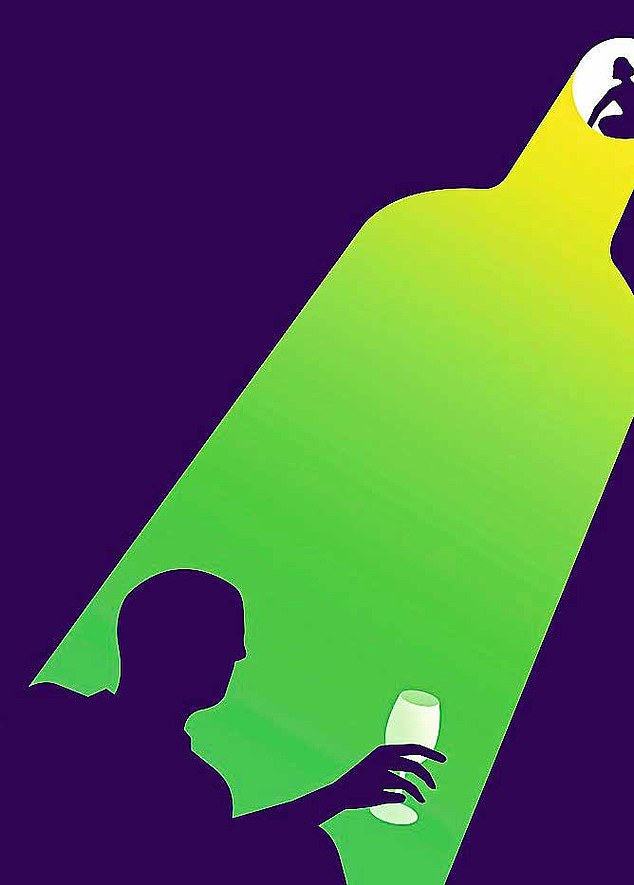Dear Bel,
I am in a relationship with a wonderful man who is kind, thoughtful, intelligent and would do anything for me.
His business was decimated by Covid and never really recovered so he doesn’t have much money to spare. We don’t live together but spend weekends and one evening a week together.
Just one thing is driving a wedge between us – he drinks extremely heavily. He never appears drunk and is in complete denial about the volume and expense of his drinking.
On a Monday morning I take my glass and cans for recycling. A couple of weeks ago I took a photo of all the bottles and cans he’d got through during Friday, Saturday and Sunday evening.
This amounted to six bottles of wine, a bottle of rum, six cans of cider, a can of beer and a miniature (equal to two measures) of liqueur.
I’ve mentioned my concerns several times and he said he wouldn’t drink on a Monday night.

‘Just one thing is driving a wedge between me and the wonderful man I am in a relationship with – he drinks extremely heavily’
Every Tuesday morning he tells me he hasn’t slept all night, but refuses to see any connection with not having a drink. He says he enjoys it but it’s beyond me as to how someone can enjoy just regularly downing so much.
When I showed him the photo and said the cost was about £70 he argued back that I’d miscalculated and the wine cost less than I said – completely ignoring the fact that the total number of units was over 80.
He had to go to the doctor recently and I asked him to be honest about how much he drinks. I thought the doctor would be appalled but apparently they just gave him a leaflet about Alcoholics Anonymous.
After I showed him the photo I became very upset as I said I’ve lost two people I loved to dementia and don’t want to lose another. He said: ‘Oh, we’ve had this conversation before,’ and I replied that nothing has changed.
I honestly don’t know what to do – I don’t want to give him an ultimatum, but I also don’t want to watch him killing himself. I’m also worried – which I also mentioned – that he may be over the drink-drive limit when he leaves in the morning.
Angela
Bel Mooney replies: It would have been interesting to know how long you have been in this relationship, how it compares with previous ones you might have had, and if there’s a marital history for each of you. (A word to readers; don’t worry about too much detail in your letters because it can be helpful, even if editing can take me a long time).
No matter. Your problem raises a perennial question which couples, older ones especially, are liable to avoid: is this relationship likely to offer me happiness in the long term?
I use the word ‘older’ simply because people over 50 are, in my experience, starting to be aware of the inexorable passage of time, and may be inclined to think: ‘I’d better take this one, because I may not get another chance.’
The ‘just one thing’ that is worrying you is an enormous problem indeed. I have a good friend, in her 60s, who was in a three-year relationship with a man who was in every way her intellectual and social equal, very charming and solvent with it, but ended the love affair because of his drinking.
In the end it outweighed all his fine qualities as well as the good times they had together. I tell you that as a warning, because this is a decision you are likely to be facing.
You tell me this semi-perfect man ‘would do anything for me’ and yet he is in denial about the extent of his alcohol dependency and impatient with you when you raise the topic more than once. That’s as bad a sign as the physical evidence, in the form of a snap shot, of his extraordinary intake.
You told him to mention his drinking to the doctor, but I would take a very large bet that he told whoppers about it. That’s what drinkers do.
You told him to mention his drinking to the doctor, but I would take a very large bet that he told whoppers about it. That’s what drinkers do.Though
You can give a man or woman like that enough Alcoholics Anonymous leaflets to wallpaper a whole house but it’s a waste of time. Unless they stop lying and actively want to change their life, no amount of information, or pleading, or nagging, will have any effect.
I’m curious about the fact that this hard-up man can spend so much money, and why you actually allow him to bring his supplies into your house. I’m assuming that’s what happens, unless he sweet-talks you into stumping up for booze as well, which seems unlikely.
Although he is clearly a functioning alcoholic who can hold his drink, the fact remains that he must be tippling for most of the time he is with you at the weekends, which necessarily prompts the question – how can you sit by and watch?
After all, it’s your house and you are the one doing the darn recycling. I don’t get it. You say: ‘I don’t want to give him an ultimatum.’ But why on earth not?
You care for him, know he’s damaging his health, witness his indifference to your wishes and his lies, yet you’re afraid to say: ‘Enough!’ Sorry, but that’s weak.
Are you so scared of him leaving you? Surely remaining in the relationship should be conditional on his willingness to change? You need to return to my question about your ultimate happiness – and answer it honestly.
Selfish siblings left me as sole carer
Dear Bel,
I find myself, in my 50s, being a full-time carer to a parent without the support of my siblings.
I’ve had to finish work, sell up and move in, and deal with the paperwork, the property and the caring.
I have approached organisations who tell me the help is not there because the system is broken. I asked for advice – the doctor offered medication.
My siblings carry on their lives without any thought, go on holiday and send happy pictures. Yet when I ask for help, they are too busy or unwell. Always an excuse. I’ve not had a break for five years.
They tell me: ‘Well, you’re in a position to care as you are no longer with your wife and had a career that you could give up as you were well off enough.’
I remind them I was left with no choice. But it shouldn’t be left to just one of us.
When our first parent passed away, they were here like a shot for money (even though they have good jobs and nice homes) but did nothing to assist in arranging the funeral or the estate. Not one person (except my friends) asked how I was.
I have a strong faith and it gets me through. I’m sure they’ll feel guilty in the future about not helping their family.
Our parents did a lot for us. How can I make my siblings sit up?
Edward

‘Your letter is measured and dignified but it came from a pretty lonely man who could reach breaking point,’ writes Bel Mooney
Bel Mooney replies: From your slightly longer letter it’s clear that what you most want is for me to give your siblings a wake-up call, so I’ll try.
Your letter is measured and dignified but it came from a pretty lonely man who could reach breaking point.
Those of us with some experience of the needs and (often) demands of very elderly parents will completely understand why you have written. We’ve faced this issue here before, but that’s because the situation is already dire.
Here’s an overview: the 2021 UK Census identified 5.8 million unpaid carers in the UK. It breaks down like this: 4.7 million in England, 311,000 in Wales, 222,000 in Northern Ireland, and 627,700 in Scotland. You can read more at carersuk.org – with many disturbing facts about the likely impact of this Government’s disability and health benefit cuts.
That aspect can only get worse as we all age, but you highlight another issue: family care.
You present no information about your siblings and don’t even specify which parent you look after. The tight self-control of your letter, displayed in that very lack of revealing detail, makes me suspect you might have found it hard to express feelings all your life. That is NOT a criticism, just a stab at understanding.
Some people take on vital duties with admirable self-control and stoicism, but those good qualities can become weapons used against them by others who lack their belief in duty.
Here, perhaps your faith plays a part. For if you believe in right and wrong and know what you should do when called on to make sacrifices, you are in danger of letting stoicism turn you into a victim.
It’s clear you believe that’s happened. Have you ever let it all out with coruscating honesty and told these selfish siblings how you really feel? Or have you been saintly and stayed pretty quiet? Have you warned them you won’t do it any more?
Presumably, if you dropped dead of a heart attack tomorrow they would all stump up and put your remaining parent into a home. Do you think so?
This is the conversation that needs to be had. I’m happy to help by telling them it’s time to be doing their duty, respecting what their parents did for them and showing some gratitude in the form of hands-on attention.
But it is you who needs to have a proper meeting with them. What will they do if you tell them flatly you will walk away?







